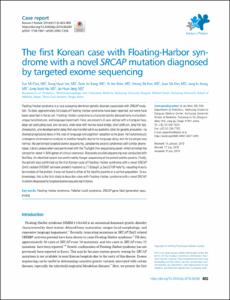The first Korean case with Floating-Harbor syndrome with a novel SRCAP mutation diagnosed by targeted exome sequencing
- Keimyung Author(s)
- Kang, Seok Jin; Shim, Ye Jee; Kim, Heung Sik; Kim, Joon Sik; Jeong, Jong In; Ha, Jung Sook
- Department
- Dept. of Pediatrics (소아청소년학)
Dept. of Otorhinolaryngology (이비인후과학)
Dept. of Laboratory Medicine (진단검사의학)
- Journal Title
- Korean Journal of Pediatrics
- Issued Date
- 2018
- Volume
- 61
- Issue
- 12
- Abstract
- Floating-Harbor syndrome is a rare autosomal dominant genetic disorder associated with SRCAP mutation. To date, approximately 50 cases of Floating-Harbor syndrome have been reported, but none have been reported in Korea yet. Floating-Harbor syndrome is characterized by delayed bony maturation, unique facial features, and language impairment. Here, we present a 6-year-old boy with a triangular face, deep-set protruding eyes, low-set ears, wide nose with narrow nasal bridge, short philtrum, long thin lips, clinodactyly, and developmental delay that was transferred to our pediatric clinic for genetic evaluation. He showed progressive delay in the area of language and cognition-adaption as he grew. He had previously undergone chromosomal analysis at another hospital due to his language delay, but his karyotype was normal. We performed targeted exome sequencing, considering several syndromes with similar phenotypes. Library preparation was performed with the TruSight One sequencing panel, which enriches the sample for about 4,800 genes of clinical relevance. Massively parallel sequencing was conducted with NextSeq. An identified variant was confirmed by Sanger sequencing of the patient and his parents. Finally, the patient was confirmed as the first Korean case of Floating-Harbor syndrome with a novel SRCAP (Snf2 related CREBBP activator protein) mutation (c.7732dupT, p.Ser2578Phefs*6), resulting in early termination of the protein; it was not found in either of his healthy parents or a control population. To our knowledge, this is the first study to describe a boy with Floating-Harbor syndrome with a novel SRCAP mutation diagnosed by targeted exome sequencing in Korea.
- Publisher
- School of Medicine (의과대학)
- Citation
- Eun Mi Choi et al. (2018). The first Korean case with Floating-Harbor syndrome with a novel SRCAP mutation diagnosed by targeted exome sequencing. Korean Journal of Pediatrics, 61(12), 403–406. doi: 10.3345/kjp.2018.06289
- Type
- Article
- ISSN
- 1738-1061
- 파일 목록
-
-
Download
 oak-2018-1127.pdf
기타 데이터 / 626.52 kB / Adobe PDF
oak-2018-1127.pdf
기타 데이터 / 626.52 kB / Adobe PDF
-
Items in Repository are protected by copyright, with all rights reserved, unless otherwise indicated.